
FIBRES & TEXTILES IN EASTERN EUROPE
Scope & Guideline
Bridging Research and Application in Eastern European Textiles
Introduction
Aims and Scopes
- Sustainable Textile Practices:
Research on eco-friendly materials, processes, and products, including bio-dyeing, recycling, and life cycle assessments to promote sustainability in the textile industry. - Smart Textiles and Technology Integration:
Investigations into the incorporation of technology into textiles, such as conductive fabrics, smart textiles for health monitoring, and applications in wearable technology. - Textile Design and Cultural Heritage:
Exploration of traditional textile techniques, designs, and cultural significance, alongside modern adaptations and innovative design methodologies. - Material Science and Engineering:
Studies on the properties, performance, and applications of various textile materials, including natural and synthetic fibres, composites, and functional textiles. - Market Trends and Economic Studies:
Analysis of market dynamics, consumer behavior, and economic impacts within the textile and clothing sectors, focusing on both regional and global perspectives.
Trending and Emerging
- Circular Economy and Recycling:
There is an increasing emphasis on the circular economy within the textile industry, focusing on recycling, waste reduction, and sustainable material sourcing as essential components of textile research. - Health and Safety in Textiles:
Emerging research on the health-related aspects of textiles, including antimicrobial properties and comfort features for protective clothing, highlights the growing concern for user safety and well-being. - Advanced Functional Textiles:
The development of advanced functional textiles that offer specific performance characteristics, such as thermal insulation, moisture management, and smart functionalities, is gaining traction. - Digital Transformation in Textile Production:
The integration of digital technologies in textile manufacturing, including automation, AI, and data analytics, is a prominent theme, reflecting the industry's shift towards Industry 4.0. - Consumer Behavior and Sustainability Awareness:
Research exploring consumer attitudes towards sustainable textiles, ethical fashion, and the impact of social media on purchasing decisions is becoming more prevalent, indicating a shift in market dynamics.
Declining or Waning
- Traditional Textile Manufacturing Techniques:
Research on conventional textile manufacturing processes appears to be decreasing, possibly due to the rise of automated and smart manufacturing technologies that prioritize efficiency and innovation. - Non-technical Textile Applications:
Studies focusing on non-technical applications of textiles, such as purely aesthetic or decorative uses, have become less prominent, reflecting a shift towards functional and performance-oriented textiles. - Basic Textile Chemistry:
Basic studies in textile chemistry, while still important, are less frequently published as the field moves towards more applied research and interdisciplinary approaches that integrate chemistry with other domains.
Similar Journals

Textile-Cloth and Culture
Innovating Discourse in Textile StudiesTextile-Cloth and Culture, published by ROUTLEDGE JOURNALS, TAYLOR & FRANCIS LTD, stands at the forefront of interdisciplinary research within the field of textile studies, integrating perspectives from arts and humanities. With an ISSN of 1475-9756 and an E-ISSN of 1751-8350, this journal fosters scholarly discourse and innovation from its United Kingdom base. Covering a wide array of topics related to textiles, cloth, and their cultural significance, Textile-Cloth and Culture is categorized in the prestigious Q2 quartile in Arts and Humanities (Miscellaneous) for 2023, holding a solid position in the Scopus ranking at #63 out of 173 journals in the general Arts and Humanities category. Since its inception in 2006, it has become a vital resource for researchers, professionals, and students, emphasizing the profound influence of textiles in cultural contexts. The journal's commitment to high-quality research provides readers with access to insightful studies, critical reviews, and innovative methodologies that further our understanding of the interplay between textiles and society, making it an essential journal for those aiming to stay updated in this dynamic field.

npj Flexible Electronics
Exploring New Dimensions in Flexible Technologynpj Flexible Electronics, published by NATURE PORTFOLIO, is a premier open-access journal dedicated to the rapidly advancing field of flexible electronics. Since its inception in 2017, the journal has gained significant recognition, boasting impressive rankings as a Q1 journal in both Electrical and Electronic Engineering and Materials Science based on the 2023 metrics. With its E-ISSN 2397-4621, the journal serves as an essential platform for researchers, professionals, and students alike, facilitating the dissemination of high-quality research articles, reviews, and insights that drive innovation across multidisciplinary applications. Operating from its base in Berlin, Germany, and characterized by a robust impact within the academic community, npj Flexible Electronics plays a critical role in shaping the future of electronic materials and devices. The journal offers comprehensive open access options, ensuring that cutting-edge research is readily available and widely disseminated, fostering collaboration and engagement within the global research community.

Arts
Transforming Perspectives on Visual and Performing ArtsArts, published by MDPI, is an esteemed open-access journal dedicated to the interdisciplinary field of arts, encompassing visual arts, performance, literature, and related studies. Since its inception in 2012, Arts has provided a platform for researchers and practitioners to disseminate innovative ideas and critical research that enrich our understanding of cultural expressions and artistic practices. With its E-ISSN 2076-0752, the journal ensures wide accessibility and dissemination of knowledge, facilitating an inclusive dialogue among artists, scholars, and students from diverse backgrounds. The journal's commitment to quality and relevance in the humanities is reflected in its robust editorial standards and peer-review process, making it a valuable resource for those engaged in artistic research. Arts serves as an essential space for academics to explore contemporary challenges and advancements in the arts, highlighting its integral role in societal discourse and cultural development.
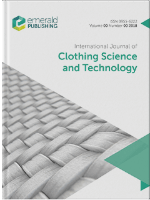
International Journal of Clothing Science and Technology
Advancing the Future of Fashion and Fabric Innovation.International Journal of Clothing Science and Technology, published by Emerald Group Publishing Ltd, is a leading academic journal dedicated to advancing the field of clothing science and technology. With a commitment to high-quality research since its inception in 1989, this journal effectively bridges the gap between innovation and application within the realms of textiles, fashion, and related materials science. The journal holds a respectable Q3 ranking across several categories, including Business, Management and Accounting (miscellaneous) and Materials Science, emphasizing its relevance in both industry and academia. Although it is not Open Access, the journal nonetheless provides critical insights and findings that are essential for researchers, professionals, and students aiming to navigate the complex world of clothing technology. From sustainable practices to new fabric technologies, the International Journal of Clothing Science and Technology remains a vital resource, equipping its readers with the latest knowledge to drive progress in this dynamic field.
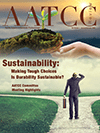
AATCC REVIEW
Connecting professionals through cutting-edge textile research.AATCC REVIEW is a distinguished journal published by the American Association of Textile Chemists and Colorists (AATCC), focusing on the interdisciplinary fields of textile chemistry, material sciences, and engineering. With an ISSN of 1532-8813, this journal serves as a vital platform for researchers and professionals engaged in the latest advancements and innovative practices within the textile industry. Despite its Q4 rankings in the 2023 category quartiles for Chemical Engineering, Chemistry, and Materials Science, AATCC REVIEW remains committed to enhancing its academic contributions and bolstering knowledge-sharing within its community. The journal, which has transitioned to a view title change in open access, enables a wider dissemination of research findings, thus supporting the global textile community in addressing contemporary challenges. With a coverage period from 2001 to 2020 and its U.S. base situated in Research Triangle Park, North Carolina, the journal plays a significant role in bridging the gap between academia and industry, making it an essential resource for students, researchers, and industry professionals alike.

INDIAN JOURNAL OF FIBRE & TEXTILE RESEARCH
Advancing textile innovation for a sustainable future.INDIAN JOURNAL OF FIBRE & TEXTILE RESEARCH (ISSN: 0971-0426, E-ISSN: 0975-1025) is a leading platform dedicated to advancing the field of textile research and innovation. Published by the NATIONAL INSTITUTE OF SCIENCE COMMUNICATION-NISCAIR in India, this open access journal has been fostering knowledge sharing since its establishment in 2006. With a broad scope encompassing Chemical Engineering, Environmental Science, and Materials Science, the journal's convergence from 1990 to 2024 highlights its commitment to ongoing academic dialogue. Currently categorized as Q3 in several disciplines, including Chemical Engineering and Environmental Science, it provides critical insights into contemporary challenges and developments. The journal's Scopus rankings further illustrate its influence within the research community, making it an essential resource for researchers, professionals, and students interested in textile technology and its intersections with sustainable practices. By fostering a collaborative environment for sharing pioneering research, the INDIAN JOURNAL OF FIBRE & TEXTILE RESEARCH stands as a vital conduit for scholarly communication in the textile sector.
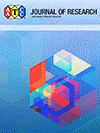
AATCC Journal of Research
Unveiling the latest trends in materials science.AATCC Journal of Research is an esteemed publication at the forefront of materials science, focusing on the latest advancements in the fields of materials chemistry, polymers and plastics, and process chemistry and technology. Published by SAGE Publications Inc. in the United States, the journal disseminates high-quality research that shapes the future of textile and materials innovation through rigorous peer-reviewed studies. With a notable impact factor indicative of its scholarly influence, AATCC Journal of Research stands out in the Q3 quartile rankings across its categories for 2023, making it a significant platform for emerging research and technological advancements. The journal's commitment to excellence is reflected in its extensive coverage from 2014 to 2024, and it is an essential resource for researchers, professionals, and students aiming to stay abreast of the latest trends and technologies in the materials science domain. While it operates under a traditional access model, the potential for pioneering knowledge exchange remains paramount, further solidifying its role in the academic and professional communities.

Research Journal of Textile and Apparel
Exploring sustainable practices in textile and apparel.Research Journal of Textile and Apparel, published by Emerald Group Publishing Ltd, serves as a pivotal platform for advancing knowledge in the fields of textile and apparel research. With an ISSN of 1560-6074, this journal has been disseminating quality research since its inception in 1997, and it continues to contribute valuable insights through to 2024. The journal holds a Q3 ranking across multiple categories, including Business and International Management, Industrial and Manufacturing Engineering, Management of Technology and Innovation, and Materials Science, reflecting its commitment to high standards of scholarship. Although not an open-access journal, it provides a vital resource for researchers, professionals, and students eager to explore innovative textile technologies and sustainable practices within the fashion industry. As the textile sector navigates significant challenges and opportunities, this journal is uniquely positioned to foster collaboration and enhance understanding among diverse stakeholders.
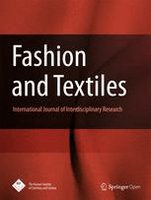
Fashion and Textiles
Navigating the Fabric of Fashion ResearchFashion and Textiles is a distinguished open-access journal published by Springer, focusing on the interdisciplinary realms surrounding fashion, textile innovation, and their socio-cultural implications. Since its inception in 2014, this journal has aimed to foster a deeper understanding of the rapidly evolving landscape of fashion and textiles through rigorous research and scholarly discourse. With an impressive Q1 ranking in Cultural Studies and prominent positions in several other categories, including Marketing and Social Psychology, the journal holds a significant place in its field. The journal, based in Singapore and accessible globally, provides authors and readers with a platform for high-quality research exchanges that influence both academia and industry practices. Open access since its launch, it has proven to be an essential resource for researchers, practitioners, and students who seek to contribute to and engage with the latest trends and developments in fashion and textiles.
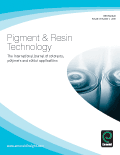
Pigment & Resin Technology
Innovating Coatings Science for Tomorrow's TechnologiesPigment & Resin Technology is an esteemed journal published by Emerald Group Publishing Ltd, focusing on the interdisciplinary fields of materials chemistry and coatings science. With a history spanning from 1972 to 2024, the journal serves as a vital platform for disseminating innovative research and developments concerning pigments, resins, and related materials technologies. Holding a respectable position in the Q3 category for both Materials Chemistry and Surfaces, Coatings, and Films as of 2023, it ranks within the 40th percentile among its peers, underscoring its relevance and impact within these domains. Although it does not currently offer open access, the journal remains a key resource for researchers, professionals, and students aiming to stay abreast of cutting-edge findings and practical applications in materials science. As such, Pigment & Resin Technology is essential reading for those engaged in the innovation and application of advanced materials in various industries.